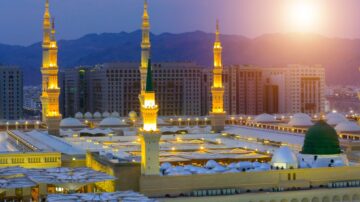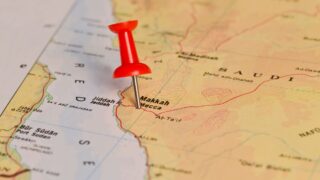Sure, Islam isn’t racist; almost any Muslim will tell you that. But Islam’s very strong stance against racism and prejudice wasn’t just demonstrated in words and principles: [O Mankind, We created you from a single (pair) of a male and a female and made you into nations and tribes, that you may know each other. Verily the most honored of you in the sight of God is he who is the most righteous of you] (Al-Hujurat:13). It was also evident in the Prophet’s establishment of the mu’akhah (brotherhood) system among Muslims .
About six months after the Muslims of Makkah had left their homes, livelihoods, and, in many cases, their families, for the sake of Allah and immigrated to Madinah, the Prophet (peace and blessings be upon him) established a system that would bring together Muslims of two different cities and different tribes.
The Muslims who had left Makkah were called Muhajirun, immigrants to Madinah; they had left their homes for the sake of Allah. They were now homeless and more or less penniless in Madinah. They needed help.
Enter the Muslims of Madinah. They became the Ansars (helpers) of their Muhajirun brothers and sisters in faith.
They Were Not Just “Roommates”
Bringing Muslims together (Mu’akhah), coming from the same root as akh “brother” in Arabic, means a system of making people brothers. The Prophet paired one Muhajir with one Ansar. They were not just temporary roommates. They became brothers in the truest sense. Not only did the Ansar Muslim provide the Muhajir Muslim with food, shelter, and clothing. He offered him consolation, support, and true Muslim fellowship.
Although there were no set rules, every one of the Ansar who got a Muhajir as his brother gave an equal share in his property and belongings to his Muhajir brother.
In the bad old days of Arab tribal enmity and prejudices, the mu’akhah system was truly revolutionary. It gave the Muhajirun a chance to rebuild their lives in their new home, while creating a deep bond of love and affection between Muslims of two very different cities.
The regional differences between people, languages, and culture, despite smaller distances as compared to today, were great.
So it was perhaps strange for people at the time to think of an Arab and a non-Arab living together as brothers.
For instance, Bilal ibn Rabah, an African Muhajir and an ex-slave, was paired as a brother with Abu Rawahah `Abdullah ibn `Abdul Rahman. And they were brothers, not mere roommates. A black man and an Arab. Who could have imagined this state of affairs in the pre-Islamic tribal Arabia?
They Even Used to Inherit from Each Other
This brotherhood was even more important than the blood relationship, since it was based on faith, not genetics or blood.
This existed to such a degree that initially, the Muslim brothers in mu’akhah would inherit from each other. However, later on, this practice was abrogated.
The mu’akhah system is clearly an example of Islam’s solid commitment to the establishment of a brotherhood based not on color, language, race, or ethnicity, but purely on faith. Muslims today need to remember this system and our community leadership should be proactive to implement the Islamic ideals.

















